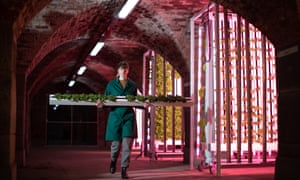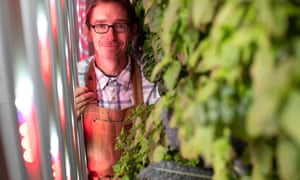Needing no soil or sun, an underground farm in Liverpool challenges traditional methods

Beautifully arranged rows of bok choi, parsley, tarragon and basil alongside dozens of variety of lettuce grow together in harmony under the pink glow of an LED light in a former sugar factory.
Water infused with nutrients trickles on to the green towers, keeping the rosettes hydrated and fed. This is a technically advanced indoor vertical farm buried deep in a basement at a former Tate & Lyle warehouse and now the Liverpool Life Sciences UTC.
Two academics pooled their resources, recruited PhD and master’s students and are growing food hydroponically in towers – an increasingly popular concept where salads and leafy greens are grown all year round under precise conditions in vertically stacked foam-filled beds without natural sunlight and soil.
The farm is the creation of Jens Thomas and Paul Myers, both with scientific backgrounds, who first met at a conference and then again at a Thai boxing class before deciding to work together. They founded Farm Urban in 2014.
Since then, they have installed systems across the city including at the University of Liverpool, Alder Hey children’s hospital and Ness Botanic Gardens and have carried out a range of public outreach activities.

Their aim is to change our relationship with food: the traditional methods of agriculture, they say, and using acres of land is no longer sustainable. The world’s population is growing – the World Health Organization estimates it will have increased to 9.7 billion people by 2050, with 70% of people living in urban areas.
To preserve natural habitats and improve worldwide food security there needs to be a complete overhaul of food production methods, say Thomas and Myers.
They are in precarious territory. Similar schemes have failed, including one in Greater Manchester. The Biospheric Foundation, based in a mill by the banks of the River Irwell in Salford, was supposed to be a state-of-the-art urban aquaponic farm, where fish waste provided the food source for growing plants, and the plants provided a natural filter for the water. Three years after the project opened, it went under more than £100,000 in debt, with the reputation of the whole scheme in tatters.
Such food production schemes face very real financial challenges. First, there are the costs that, if not carefully managed, could end up being astronomical. They are mainly associated with the energy use required to maintain a controlled environment and provide artificial light. There is the issue of the carbon footprint of using high amounts of energy amid efforts to reduce greenhouse gas emissions. There has also been criticism of the farms for being geared to producing only leafy greens and not higher-calorie crops.
Thomas and Myers insist their project is different. Their aims are hyperlocal – they want to start small and gear production in tandem with increasing commercial interest in their products. Their current vertical farm, which was shipped over from Canada, has been paid for by First Ark, a Knowsley-based social investment organisation. The £150,000 funding is part-loan and part-grant.
Thomas and Myers are hoping to recoup some of the cash by selling salad boxes for £12.50 to individuals and businesses, with annual subscriptions costing £600. They have also launched a crowdfunding campaign, Greens for Good, where every box of greens bought by a local business supports a box of greens going to a local school. They have raised more than £17,000 of their £25,000 goal.

Myers, 32, the son of a hairdresser and entrepreneur, became interested in food production while working on his PhD at the National Cancer Institute. Billions are spent on drugs research, but he feels there needs to be a more holistic approach to look at how diet and food quality can affect health.
“This is the farming of the future. Pesticide-free and moving from the traditional horse and tractor agriculture that is steadily destroying the planet to a more sustainable approach,” he says.
Myers is fully aware of the risks of his chosen career path. “Yes, I am a bit scared – we have taken on a huge debt – but we de-risked it as much as humanly possible and now it’s just a case of carrying on and working to make it work.”
He certainly has the backing of students Emmanuella Aul-Mku and Rhianna Ghalleb, both 14, who have seen firsthand the benefits of growing salad in vertical farms. Their school canteen upstairs serves salad from the farm and pupils are regularly invited into the basement to see the mechanics of the technologically advanced food production.
Ghalleb, who spent some of her childhood in Tunisia, and Aul-Mku in Nigeria, both come from families which grew their own vegetables and fruit in their back gardens.
“My nanna had olive trees and figs and I would do gardening with her all the time and help her grow things but we don’t do that here. We just go to Asda and buy our food in plastic packets – we don’t know what conditions it has been grown in – what has been used to help it grow,” says Ghalleb.
Aul-Mku agrees this reliance on supermarkets affects people’s relationship with food and thinks these new vertical farms could change that.
“We get to see it growing in front of us and that really makes a difference. If there were farms like this everywhere then people would be able to feel part of a community because they would all be growing food for each other,” she says.





